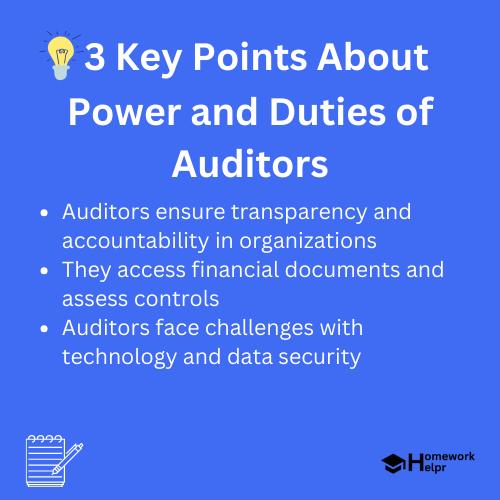📝 Summary
Auditors are vital in the business world as they examine and evaluate financial records to ensure transparency and accountability. They conduct independent reviews of financial statements, ascertain their truthfulness, identify discrepancies, and assure stakeholders about organizational health. Auditors possess significant powers like access to vital information, communication with stakeholders, and assessment of internal controls. Their key duties include planning and conducting audits and reporting findings while upholding ethics. They conduct various audits, such as internal, external, and compliance audits, all while ensuring adherence to evolving regulations and addressing challenges like technological advancements and data security. Auditors play a crucial role in establishing trust within the financial system.
Understanding the Power and Duties of Auditors
Auditors play a crucial role in the business world by examining and evaluating financial records. Their work ensures transparency and accountability within organizations. In this article, we will explore the various powers and duties of auditors, emphasizing their importance in maintaining trust in the financial system.
The Role of Auditors
At the core of their profession, auditors are responsible for conducting an independent review of an organization‚’ financial statements. This ensures that the information provided to stakeholders is accurate and reliable. The main reasons why auditors are employed include:
- To ascertain the truthfulness of financial statements.
- To identify any discrepancies or fraud.
- To provide assurance to stakeholders about the financial health of the organization.
Auditors can work in various sectors, including private companies, public organizations, non-profits, and government agencies, serving as the watchdogs of financial integrity.
Powers of Auditors
Auditors possess a variety of powers that enable them to perform their duties effectively. These powers can be categorized into several key areas:
- Access to Information: Auditors have the authority to access all necessary financial documents.
- Communication: They can communicate directly with stakeholders to gather insights.
- Assessment: Auditors assess internal controls and operational procedures.
These powers give auditors the leverage to produce reliable and comprehensive analyses, ensuring they fulfill their responsibilities without any obstruction.
Definition
Discrepancies: Variations or inconsistencies in data that may indicate errors or fraudulent activities. Stakeholders: Individuals or groups that have an interest in an organization’s performance, including employees, investors, customers, and suppliers.
Duties of Auditors
Auditors bear numerous responsibilities that go hand-in-hand with their powers. Some of the primary duties include:
- Planning the Audit: They must develop an audit plan that outlines the scope and objectives of the audit.
- Conducting the Audit: They execute the audit according to the plans, ensuring adherence to standards and regulations.
- Reporting Findings: After the audit, auditors are required to compile their findings into a report for stakeholders.
Throughout the auditing process, auditors must remain objective, independent, and maintain a high level of ethical standards to ensure credibility.
Example
For instance, if an auditor finds that a company‚’ total assets do not match with its liabilities during the audit, it indicates a potential financial issue, prompting further investigation.
Types of Audits
Auditors can conduct various types of audits, each with its specific focus and purpose. The most common types include:
- Internal Audits: These assess the company’s internal controls and operational efficiency.
- External Audits: Conducted by independent auditors, these audits evaluate the accuracy of financial statements.
- Compliance Audits: These ensure that an organization adheres to external regulations.
Each type of audit serves a distinct function, further enhancing the accountability of the organization being audited.
Importance of Auditors in Society
Auditors are vital not only for the organizations they serve but also for the overall economic system. Their work fosters trust among stakeholders, and their findings can:
- Influence investment decisions.
- Enhance the public’s confidence in financial markets.
- Encourage organizations to maintain high ethical standards.
Ultimately, auditors help ensure that businesses operate honestly and transparently, which is essential for a healthy economy.
💡Did You Know?
Did you know that Ancient Egyptians employed scribes who functioned similarly to modern-day auditors to ensure the collection of taxes was accurate?
The Challenges Faced by Auditors
Despite their pivotal role, auditors face various challenges that can complicate their tasks. Some of these challenges include:
- Technological Advancements: Rapid changes in technology require auditors to continuously adapt and update their skills.
- Data Security: As auditors handle sensitive information, they need to be proactive about protecting data privacy.
- Complex Financial Transactions: Accounting standards are evolving, which can lead to inconsistencies in financial reporting.
By recognizing these challenges and working diligently to address them, auditors can continue to uphold their responsibilities effectively.
Conclusion
In summary, the powers and duties of auditors are fundamental to the integrity of financial statements and the overall health of businesses worldwide. With their ability to access information, assess internal controls, and communicate findings, auditors play an essential role in promoting transparency and accountability. Their work not only protects individual organizations but also fosters trust in the global financial system. As future professionals, understanding the significance of audit work can inspire students to consider careers in this vital field.

Related Questions on Power and Duties of Auditors
What are the primary duties of auditors?
Answer: Auditors are responsible for planning the audit, conducting the audit according to standards, and reporting findings to stakeholders.
What powers do auditors have?
Answer: Auditors have powers such as accessing necessary financial documents, communicating directly with stakeholders, and assessing internal controls.
Why are auditors important in society?
Answer: Auditors maintain trust among stakeholders, influence investment decisions, and ensure organizations uphold ethical standards.
What types of audits do auditors conduct?
Answer: Auditors conduct internal audits, external audits, and compliance audits, each serving a specific purpose related to financial assessment and accountability.
